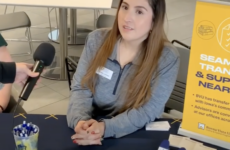
Spanish instructor Andrea Mendoza-Estling poses in Building 8. Photo by Riley Dickerson
Andrea Mendoza-Estling teaches Spanish I and Spanish II at DMACC. She has resided in the U.S. for 20 years, eight of those in Iowa, and has been teaching for 13 years, something she said she finds passion in.
“I’m from the capital of Colombia, Bogota. When I was living in Bogota, close to 8 million people lived there,” said Mendoza.
In Bogota, there was always something to do — the weather was beautiful, said Mendoza. Coming to Warroad Minnesota from Colombia in 2002 was a big change. Mendoza said that even though it was summer there was nothing to do, it was just flat land everywhere.
Mendoza also made it clear there are major cultural differences. Coming from a big city with lots of diversity to a small town with few houses and less diversity in rural America, “It is a culture shock, to say the least,” she said.
Mendoza also said that in Latin culture where she comes from there is little or no personal space. “In Colombia, we hug and kiss each other on the cheek and it is normal, but here in America that is not normal; coming to the United States you must adapt and have cultural intelligence,” she said.
Mendoza has lived in other states in the U.S. including Minnesota, Kansas, North Dakota, South Dakota, Wyoming, Idaho, and finally Iowa. She also visited California, where her daughter currently lives. For the first time in the U.S., she felt at home.
“I feel like I belonged in California because it’s much more diverse with much larger Hispanic representation,” she said.
The food was much different than anything she could get in Iowa. She said that she did not feel safe in California she loved the culture but felt unsafe. In Iowa however, she said, “The majority of people from Iowa are very friendly.”
In her experience, snow or rain, it doesn’t matter, people here will help when you have a flat tire, but those in a big city in a rush will not stop to help oftentimes.
During her time in Colombia Mendoza completed her high school education. Mendoza received a bachelor’s degree from the University of North Dakota in Spanish Education and received a master’s degree from The University of Northern Iowa in Spanish and literature.
“I came here with no money, no English, and really zero knowledge,” she said.
Mendoza’s first job in the United States was as a housekeeper because she didn’t know the language. She then worked at a company called Marvin Windows in Minnesota, which would offer her the opportunity of a lifetime: free English lessons with an instructor from a community college. The company told her they wanted to improve her position in the company, telling her if she could finish with a C or better her books would be paid for.
“You have to be willing to be vulnerable and willing to try and learn English,” Mendoza said. “I got a C; that C to me meant an A because I put all my effort, my time, my everything into it,” she added.
She would record the lectures, and she had a very helpful tutor. Even if she was very tired, she would work 8-12 hours with the tutors. This hard work and dedication shaped her into who she is today.
Mendoza had advice for someone in her shoes coming from a foreign country who may know little or no English: “I would say resilience. That would be one thing, You have to take one day at a time, for sure, and learn English,” she said. “This will allow you more opportunities here in the U.S.,” she added.
She also suggests that people remember who they are and even though you adapt to the culture around you don’t change who you are.
“A metaphor that I would like to use is we are a tree, we still have the same roots, but we start getting new branches and grow more, adapt to the culture be resilient, and do your best to learn English,” she said.
“The last thing I will say is enjoy life and be happy. Be willing to learn new things meet new people and get new experiences because life is too short, surround yourself with positive people and people who can teach you something, and maybe you can teach them something, like an exchange of knowledge and exchange of cultures,” she said.
Mendoza said she believes the American dream is still alive and well give it everything you have and you can achieve this.
“You have to be willing to work, be able to be vulnerable, be able to learn, and be able to work hard,” she said.
“Be a role model for those who are coming behind you for those new immigrants who are coming behind you,” Mendoza said.





Comments